Unit 2 What time do you go to school?第1课时(SectionA 1a-2d)课件+嵌入音频(共57张PPT)
文档属性
| 名称 | Unit 2 What time do you go to school?第1课时(SectionA 1a-2d)课件+嵌入音频(共57张PPT) | 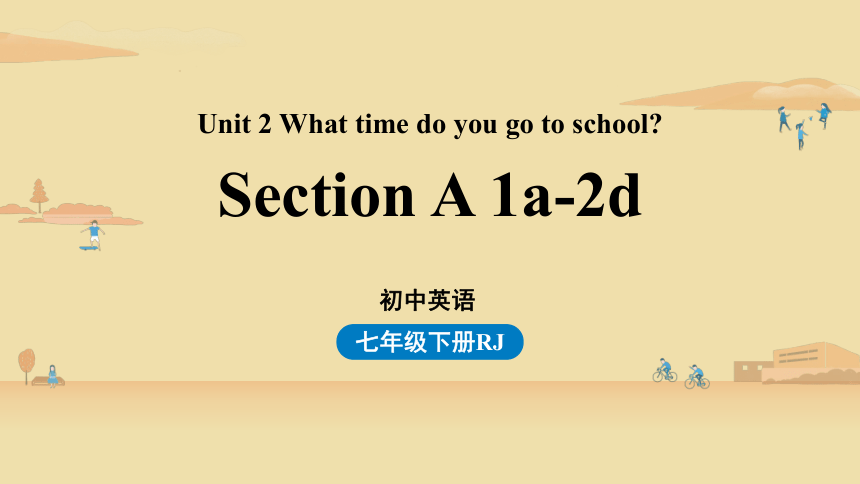 | |
| 格式 | zip | ||
| 文件大小 | 15.0MB | ||
| 资源类型 | 教案 | ||
| 版本资源 | 人教新目标(Go for it)版 | ||
| 科目 | 英语 | ||
| 更新时间 | 2022-09-04 07:28:38 | ||
图片预览

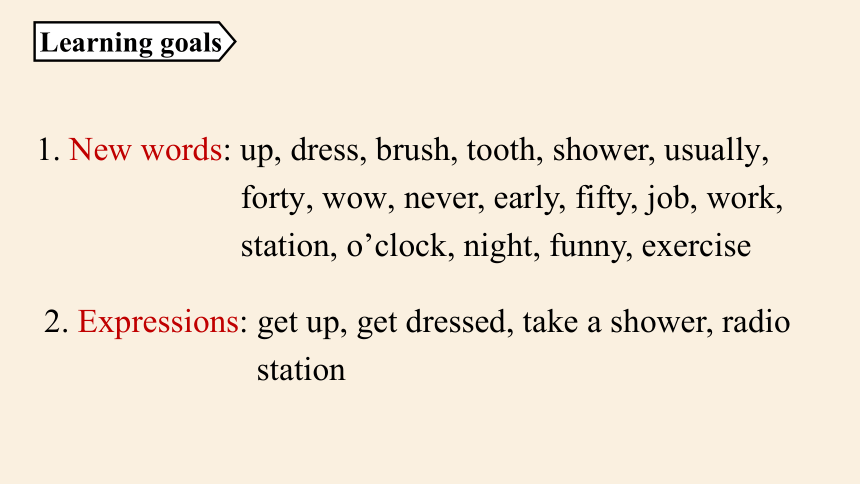
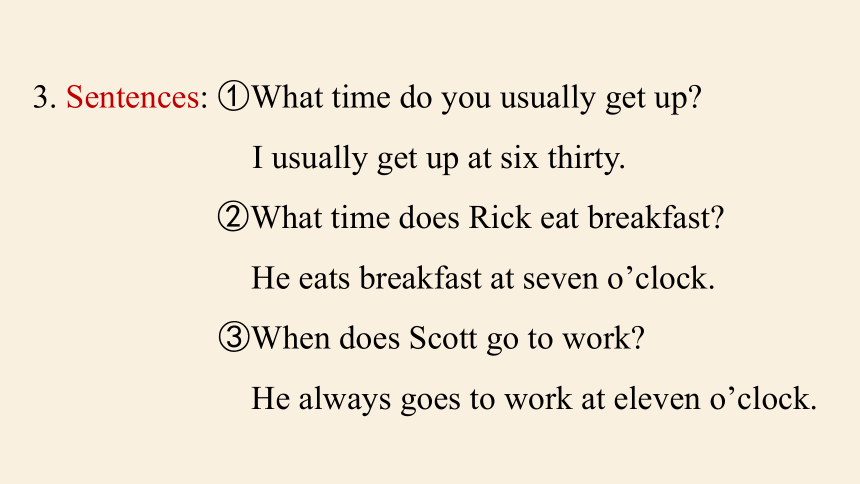
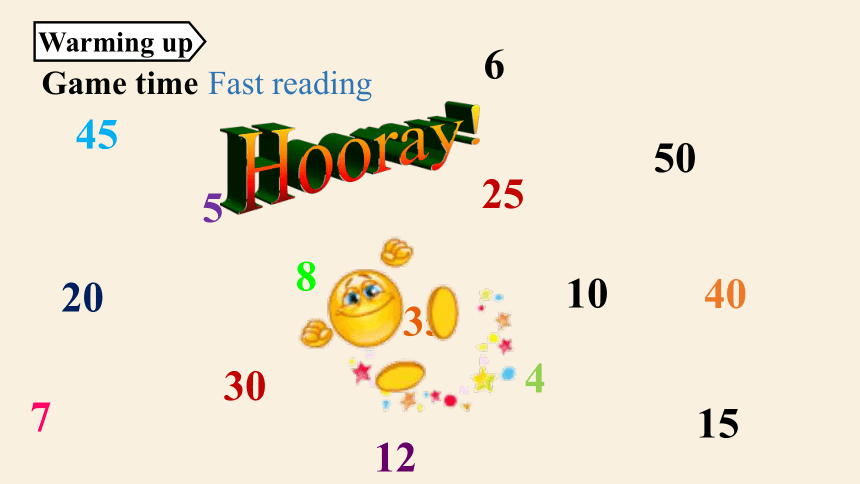
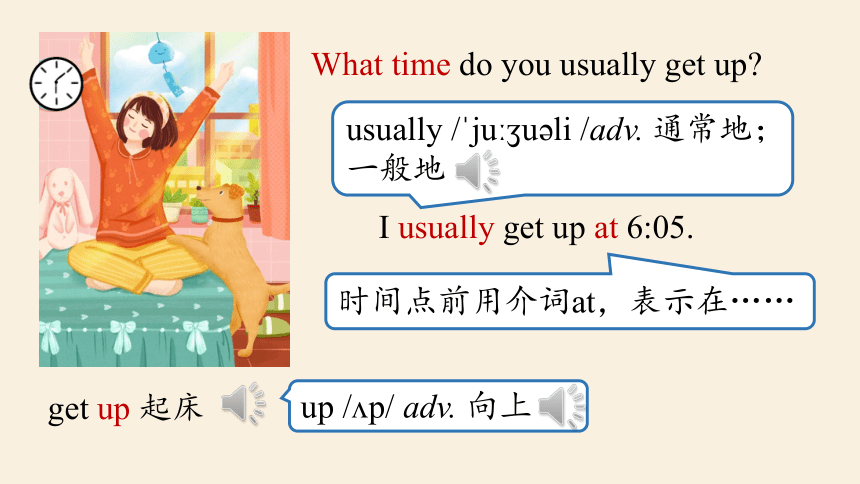
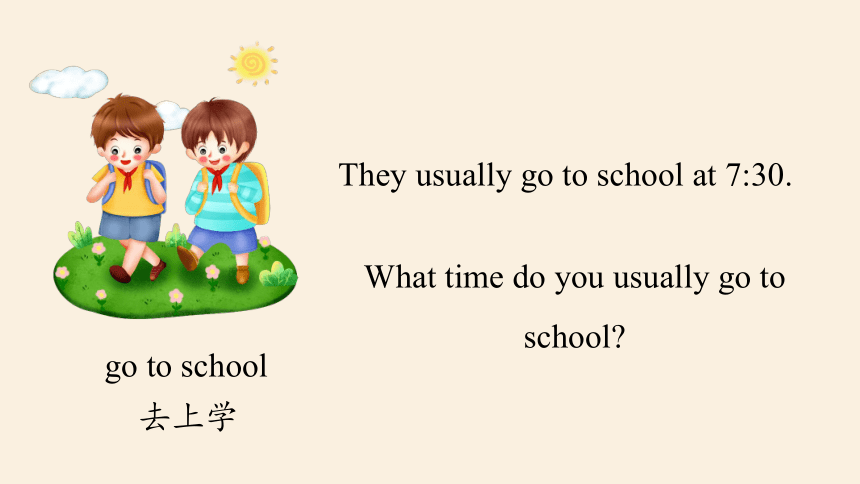
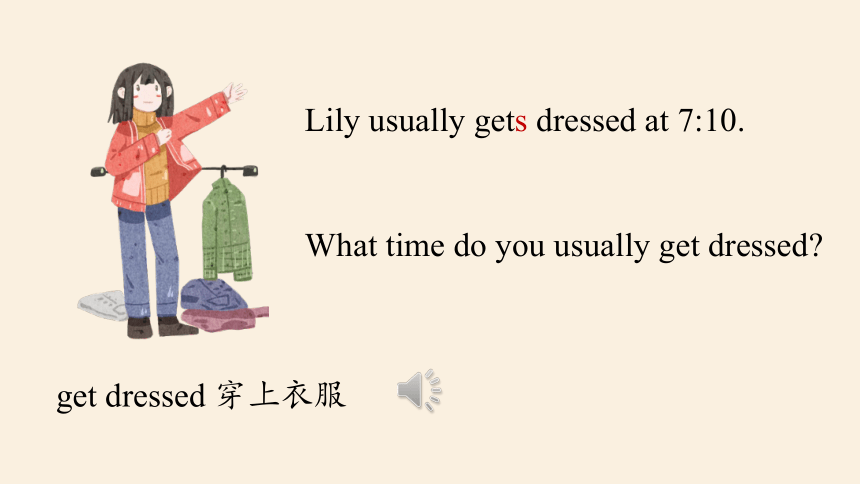
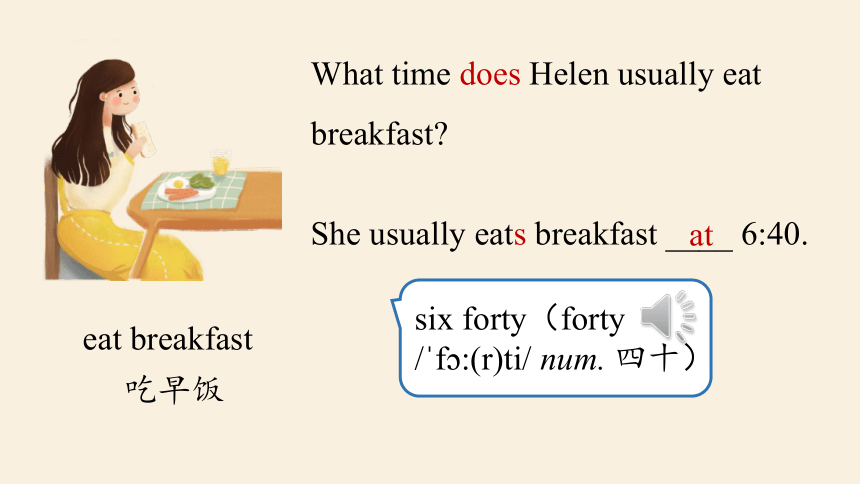
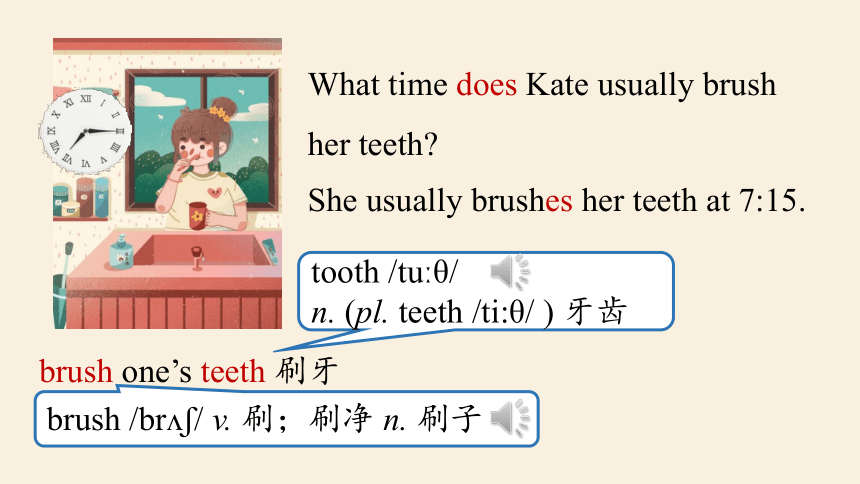
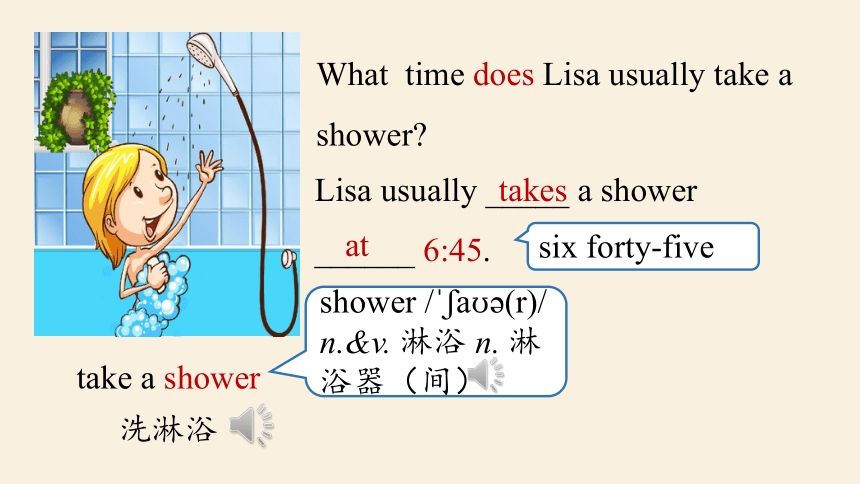
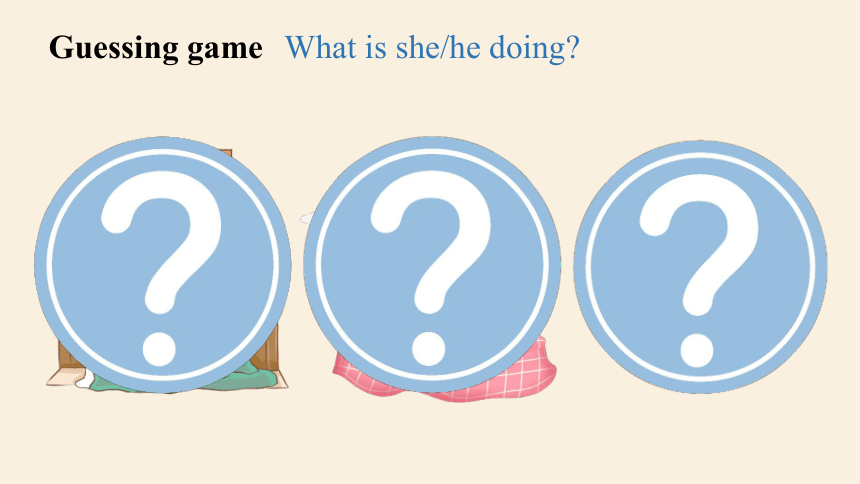
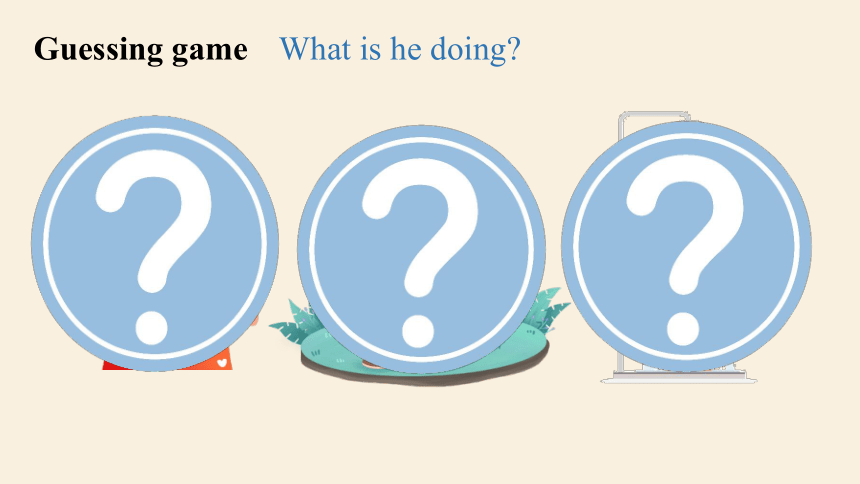
文档简介
(共57张PPT)
Section A 1a-2d
Unit 2 What time do you go to school
七年级下册RJ
初中英语
1. New words: up, dress, brush, tooth, shower, usually, forty, wow, never, early, fifty, job, work, station, o’clock, night, funny, exercise
2. Expressions: get up, get dressed, take a shower, radio station
Learning goals
3. Sentences: ①What time do you usually get up
I usually get up at six thirty.
②What time does Rick eat breakfast
He eats breakfast at seven o’clock.
③When does Scott go to work
He always goes to work at eleven o’clock.
Fast reading
45
5
9
25
50
8
20
40
4
30
12
10
15
7
35
Hooray!
Game time
6
Warming up
I usually get up at 6:05.
What time do you usually get up
get up 起床
usually / ju u li /adv. 通常地;一般地
时间点前用介词at,表示在……
up / p/ adv. 向上
They usually go to school at 7:30.
What time do you usually go to school
go to school
去上学
Lily usually gets dressed at 7:10.
What time do you usually get dressed
get dressed 穿上衣服
She usually eats breakfast ____ 6:40.
What time does Helen usually eat breakfast
eat breakfast
吃早饭
at
six forty(forty / f :(r)ti/ num. 四十)
She usually brushes her teeth at 7:15.
What time does Kate usually brush her teeth
brush one’s teeth 刷牙
tooth /tu θ/
n. (pl. teeth /ti:θ/ ) 牙齿
brush /br / v. 刷;刷净 n. 刷子
Lisa usually _____ a shower ______ 6:45.
What time does Lisa usually take a shower
take a shower
洗淋浴
takes
at
six forty-five
shower / a (r)/
n.&v. 淋浴 n. 淋浴器(间)
Guessing game
What is she/he doing
What is he doing
Guessing game
take a shower
what time
get up
get dressed
brush one’s teeth
usually
seven o’clock
eat breakfast
six forty
Game time
What time do the clocks tell us
What are the actions of the
children
Look at the picture and answer the questions.
1a Match the activities with the pictures.
1. get up __
2. go to school __
3. get dressed__
4. brush teeth__
5. eat breakfast __
6. take a shower__
c
d
b
f
e
a
—What time is it
— It’s seven o’clock.
o’clock / kl k/ / klɑ k/ adv. (表示整点)……点钟,不能单独使用,必须和整点时间连用,在口语中可以省略。
—What time is it
— It’s ten ten.
非整点时刻:
直接表达法,用基数词,按“小时+分钟”的顺序写出时刻。
—What time is it
— It’s twelve twenty-five.
1b Listen and match the times with the actions. Draw lines from the clocks to the pictures.
Interviewer: What time do you usually get up, Rick
Rick: Um, I usually get up at six thirty.
Interviewer:And what time do you brush your teeth and take a shower
Rick: I brush my teeth and take a shower at six forty.
Interviewer: Hmm. What time do you eat breakfast
Rick: Seven o’clock.
Interviewer: And what time do you usually get dressed
Rick: I usually get dressed at seven twenty.
Interviewer: And my last question. What time do you go to school
Rick: I usually go to school at seven thirty.
Interviewer: Thank you.
Listen and read.
Listen and write the times.
Daily activities Time
get up (c)
brush teeth (f)
take a shower (a)
eat breakfast (e)
get dressed (b)
go to school (d)
6:30
6:40
6:40
7:00
7:20
7:30
Make conversations according to 1b.
What time do you usually get up, Rick
I usually get up at six thirty.
Fill in the blanks.
Rick usually gets up at six thirty every morning. He 1._______________ and takes a shower at six forty. He eats breakfast 2.______________________. He 3.____________ at seven twenty, and then he goes to school 4.___________________________________.
brushes his teeth
at seven (o’clock)/at 7:00
gets dressed
at half past seven/at 7:30
at seven thirty/
1c Student A is the interviewer. Student B is Rick. Ask and answer questions about Rick’s day.
What time do you usually take a shower, Rick
I usually take a shower at six forty.
get dressed为固定短语,其后不接任何宾语。
1. get dressed 穿上衣服 (教材P7 1a)
Language points
“be dressed in + 衣服/颜色”意为“穿着……”,表示穿的状态。
She is dressed in red. 她穿着红色的衣服。
My young brother is only two years old. He can’t get dressed. 我的弟弟只有两岁,他不会穿衣服。
2. brush teeth 刷牙(教材P7 1a)
brush /br / v. 刷;刷净 n. 刷子
发音小助手:字母u在brush中发/ /音。字母u发/ /音的单词还有club、 up、 funny、 run等。
(1) brush在此处作及物动词,意为“刷;刷净” ,其第三人称单数形式为brushes。
You should learn to brush your shoes. 你应该学着刷你的鞋。
(2) brush还可作可数名词,意为“刷子” ,其复数形式为brushes。
I need some new brushes. 我需要几把新刷子。
v. 刷 brush n. 刷子
2. brush teeth 刷牙(教材P7 1a)
tooth /tu θ/ n.牙齿
tooth作可数名词,其复数形式为teeth,读作/ti:θ/。
These meat-eating fish have sharp teeth. 这些食肉性的鱼有着锋利的牙齿。
【特别提醒】brush (one’s) teeth意为“刷牙”,其中“牙齿”要用复数形式teeth表达,one’s是形容词性物主代词或名词所有格。
It’s good for you to brush your teeth twice a day. 一天刷两次牙对你有好处。
【拓展】变复数时将“oo”变成“ee”的名词还有:
foot — feet(脚) goose — geese(鹅)
teeth
feet
geese
3.eat breakfast 吃早餐(教材P7 1a)
Let’s eat breakfast.我们吃早餐吧。
Laura often has a quick lunch at school.劳拉在学校经常匆忙地吃午餐。
表示一日三餐的名词 (breakfast、lunch、supper/dinner) 前面通常不用冠词,但当其前有某些形容词 (如good、quick、big等) 修饰时,通常要加不定冠词。
【拓展】“三餐”与介词搭配:
“三餐”与介词搭配
“for+三餐”表示“关于早/午/晚饭”
I’d like rice for lunch.午饭我想吃米饭。
“at+三餐”表示“就餐时;进餐时”
My father tells a joke at breakfast.吃早饭时我爸爸讲了一个笑话。
“before/after+三餐”表示“餐前/后”
After dinner, I usually go out for a walk.晚饭后,我通常出去散步。
4. What time do you usually get up, Rick 里克,你通常几点起床?(教材P7 图片文字)
what time 什么时间
what time用来引导特殊疑问句,提问具体的时间。
What time does the breakfast start 早饭几点开始
4. What time do you usually get up, Rick 里克,你通常几点起床?(教材P7 图片文字)
usually / ju: u li/ adv. 通常地;一般地
【用法详解】usually 作频度副词,表示某事发生的频率,通常位于实义动词之前,助动词、情态动词或连系动词 be 之后。
Mary usually goes to school at 7. 玛丽通常七点去上学。
位于实义动词之前
I’m usually so early. 我通常都这么早。
位于连系动词be之后
Look at the picture and answer the questions.
1. How many children can you see in the picture
2. How many boys are there in the picture
3. How many girls are there in the picture
2a Listen to the conversation and complete the sentences.
Jim has ________brothers and ________ sisters. Jim’s family has ______shower.
two
two
one
2. What does the word “schedule” mean
1. Does Jim have a big family Why do you think so
3. Is it difficult for Jim’s family to take showers
做笔记要写关键词,时间写数字
2b Listen again. Complete the shower schedule for Jim’s family.
Name Bob Mary Jack Jim Anna
Time 5:30
5:50
6:15
6:30
6:45
淋浴时间表
Interviewer: You have a big family, don’t you, Jim
Jim: Yes, I have two brothers and two sisters.
Interviewer: Wow! How many showers do you have
Jim: We only have one shower.
Interviewer: Is that difficult
Jim: No, because we have a shower schedule. My brother Bob takes a shower first at five thirty.
Interviewer: Wow! That’s early!
Jim: Yeah. Then my sister Mary takes a shower at five fifty. Next my brother Jack takes a shower at six fifteen. I take a shower at six thirty, my sister Anna at six forty-five…
Listen and read.
2c Now talk about yourself.
What time do you usually get up
Do you get dressed quickly
Do you have breakfast at home or at school What time do you have breakfast
What time do you usually go to school
When do you do your homework
I never get up so early. 我从不这么早起床。(教材P8 2c)
never作副词,表示某事发生的频率为零。
I never know such a person. 我从不知道这样一个人。
He is never late for school. 他上学从不迟到。
never / nev (r)/ adv. 从不;绝不
Language points
early在此处作副词,意为“早”,多位于被修饰词之后。此外,early 还可作形容词,意为“早的”,多位于被修饰词之前。
Could you come back home early this evening 今天晚上你能早点回家吗?
I like the early morning sunshine. 我喜欢清晨的阳光。
early / (r)li/ adv.& adj. 早(的)
作副词,修饰come back
作形容词,修饰morning
I never get up so early. 我从不这么早起床。(教材P8 2c)
Where does the man work
Look at the picture in 2d and answer the questions.
What’s his job
He works at a radio station.
/w (r)k/ v. & n.工作
广播电台
station / ste n/ n. 电(视) 台;车站
job /d b/, /d ɑ b/ n. 工作; 职业
Perhaps he is a DJ. He plays music for people.
1. Does Scott have an interesting job Why do you think so
Yes, he does. Because his work time is different from the others’.
2. When does he get up Does he get up in the morning or at night
He gets up at eight thirty at night.
3. When does he eat breakfast
He eats breakfast at nine at night.
Read the conversation in 2d and answer the questions.
4. Why does the interviewer say that it is a funny time to eat breakfast
He eats breakfast at night, not in the morning.
Interviewer: Scott has an interesting job. He works at a radio station. Scott, what time is your radio show
Scott: From twelve o’clock at night to six o’clock in the morning.
Interviewer: What time do you usually get up
Scott: At eight thirty at night. Then I eat breakfast at nine.
Interviewer: That’s a funny time for breakfast!
Scott: Yeah. After that, I usually exercise at about ten twenty.
Interviewer: When do you go to work
Scott: At eleven o’clock, so I’m never late for work.
Listen and read.
/na t/ n. 晚上;夜晚 at night 在晚上
/ f ni/adj.奇怪的;滑稽好笑的
/ eks sa z /v. & n. 锻炼;练习 在此作动词
Interviewer: Scott has an interesting job. He works at a radio station. Scott, what time is your radio show
Scott: From twelve o’clock at night to six o’clock in the morning.
Interviewer: What time do you usually get up
Scott: At eight thirty at night. Then I eat breakfast at nine.
Interviewer: That’s a funny time for breakfast!
Scott: Yeah. After that, I usually exercise at about ten twenty.
Interviewer: When do you go to work
Scott: At eleven o’clock, so I’m never late for work.
2d Role-play the conversation.
Interviewer: Scott has an interesting job. He works at a radio station. Scott, what time is your radio show
Scott: From twelve o’clock at night to six o’clock in the morning.
Interviewer: What time do you usually get up
Scott: At eight thirty at night. Then I eat breakfast at nine.
Interviewer: That’s a funny time for breakfast!
Scott: Yeah. After that, I usually exercise at about ten twenty.
Interviewer: When do you go to work
Scott: At eleven o’clock, so I’m never late for work.
Disappearing dialogue.
—What time do you usually...
—I usually...
—What time does she/he usually...
—She/He usually...
get up 6:40
take a shower 6:50
brush teeth 6:50
eat breakfast 7:00
get dressed 7:30
go to school 7:50
go to work 8:00
exercise 10:10
1. He works at a radio station. 他在一家广播电台工作。(教材P8 2d)
(1) work 在此作不及物动词。worker 是名词,意为“工人”。
Do you work in a school 你是在学校工作吗?
(2) work 还可作不可数名词,指人们在日常生活和工作中从事的体力或脑力劳动,即各类工作。at work 表示“在工作”。
work /w (r)k/ v. & n. 工作
Language points
【易混辨析】work 与 job
两者作名词,都可意为“工作”,区别如下:
work 不可数名词 泛指抽象意义的工作
job 可数名词 指具体的某种工作或职业
He has a lot of work to do today. 他今天有许多工作要做。
After a long day at work, nothing is better than a good night’s sleep! 工作了一整天,没有什么比睡个好觉更好的了!
2.From twelve o’clock at night to six o’clock in the morning. 从夜里十二点到早.上六点。(教材P8 2d)
from... to... 从……到……
from... to...可以用来连接两个时间或地点,也可以表示幅度或范围。
We go to school from Monday to Friday. 我们从星期一到星期五上学。(连接两个时间)
Danny goes from Jinan to Wuhan by train. 丹尼乘火车从济南到武汉去。(连接两个地点)
The store sells everything from books to computers. 这家商店出售的商品从书籍到电脑应有尽有。(表示范围)
3. After that, I usually exercise at about ten twenty. 在那之后,我通常十点二十左右锻炼(身体)。(教材P8 2d)
exercise在此处作动词,意为“锻炼”。
My grandparents exercise every day. 我的爷爷奶奶天天锻炼身体。
【拓展】exercise还可作名词,常见用法如下:
exercise / eks sa z/ v.& n. 锻炼;练习
exercise n.
不可数名词
可数名词
表示“锻炼;运动”,常和take、 do、 get等词连用
表示“一套动作”或“练习,习题”,如do morning exercises做早操
We often do exercises in English class. 我们经常在英语课上做练习。
【图解助记】exercise的一词多义:
do/take exercise
做运动;锻炼
do eye exercises
做眼保健操
do math exercises
做数学练习题
1.—What time do you usually get up
— _____7:00.
A. At B. In C. On
2.(岳阳中考)We should brush our ______ every day.
A. tooth B. teeth C. hand
3.Scott has a busy ___ and he has much ___ to do every day.
A. work, work B. job, work C. job, job
一、单项选择
A
B
B
Exercises
二、用所给单词的适当形式填空
1.I _______(usual) go to school by bike.
2.They always get _______(dress) at seven o’clock.
3.Susan never _______(work) on weekends.
4.The old man ________(exercise) every morning.
5.I usually_______(take) a shower before breakfast.
usually
dressed
works
exercises
take
三、根据首字母或汉语提示完成句子
1.(广州中考) N______ cross the road when the traffic light is red.
2.My house is far from the workplace, so I usually get up very e______.
3.(济宁中考) It’s a good habit to brush your ______(牙齿) after a meal.
4.My _______(工作) is taking care of the baby.
5.Can you tell a _______ (滑稽好笑的) story to make us laugh
ever
funny
teeth
job
arly
get up, get dressed, take a shower, radio station,
①What time do you usually get up
I usually get up at six thirty.
②What time does Rick eat breakfast
He eats breakfast at seven o’clock.
③When does Scott go to work
He always goes to work at eleven o’clock.
Useful expressions
Sentences
Key words
up, dress, brush, tooth, shower, usually, forty, wow, never, early, fifty, job, work, station, o’clock, night, funny, exercise
Summary
Section A 1a-2d
Unit 2 What time do you go to school
七年级下册RJ
初中英语
1. New words: up, dress, brush, tooth, shower, usually, forty, wow, never, early, fifty, job, work, station, o’clock, night, funny, exercise
2. Expressions: get up, get dressed, take a shower, radio station
Learning goals
3. Sentences: ①What time do you usually get up
I usually get up at six thirty.
②What time does Rick eat breakfast
He eats breakfast at seven o’clock.
③When does Scott go to work
He always goes to work at eleven o’clock.
Fast reading
45
5
9
25
50
8
20
40
4
30
12
10
15
7
35
Hooray!
Game time
6
Warming up
I usually get up at 6:05.
What time do you usually get up
get up 起床
usually / ju u li /adv. 通常地;一般地
时间点前用介词at,表示在……
up / p/ adv. 向上
They usually go to school at 7:30.
What time do you usually go to school
go to school
去上学
Lily usually gets dressed at 7:10.
What time do you usually get dressed
get dressed 穿上衣服
She usually eats breakfast ____ 6:40.
What time does Helen usually eat breakfast
eat breakfast
吃早饭
at
six forty(forty / f :(r)ti/ num. 四十)
She usually brushes her teeth at 7:15.
What time does Kate usually brush her teeth
brush one’s teeth 刷牙
tooth /tu θ/
n. (pl. teeth /ti:θ/ ) 牙齿
brush /br / v. 刷;刷净 n. 刷子
Lisa usually _____ a shower ______ 6:45.
What time does Lisa usually take a shower
take a shower
洗淋浴
takes
at
six forty-five
shower / a (r)/
n.&v. 淋浴 n. 淋浴器(间)
Guessing game
What is she/he doing
What is he doing
Guessing game
take a shower
what time
get up
get dressed
brush one’s teeth
usually
seven o’clock
eat breakfast
six forty
Game time
What time do the clocks tell us
What are the actions of the
children
Look at the picture and answer the questions.
1a Match the activities with the pictures.
1. get up __
2. go to school __
3. get dressed__
4. brush teeth__
5. eat breakfast __
6. take a shower__
c
d
b
f
e
a
—What time is it
— It’s seven o’clock.
o’clock / kl k/ / klɑ k/ adv. (表示整点)……点钟,不能单独使用,必须和整点时间连用,在口语中可以省略。
—What time is it
— It’s ten ten.
非整点时刻:
直接表达法,用基数词,按“小时+分钟”的顺序写出时刻。
—What time is it
— It’s twelve twenty-five.
1b Listen and match the times with the actions. Draw lines from the clocks to the pictures.
Interviewer: What time do you usually get up, Rick
Rick: Um, I usually get up at six thirty.
Interviewer:And what time do you brush your teeth and take a shower
Rick: I brush my teeth and take a shower at six forty.
Interviewer: Hmm. What time do you eat breakfast
Rick: Seven o’clock.
Interviewer: And what time do you usually get dressed
Rick: I usually get dressed at seven twenty.
Interviewer: And my last question. What time do you go to school
Rick: I usually go to school at seven thirty.
Interviewer: Thank you.
Listen and read.
Listen and write the times.
Daily activities Time
get up (c)
brush teeth (f)
take a shower (a)
eat breakfast (e)
get dressed (b)
go to school (d)
6:30
6:40
6:40
7:00
7:20
7:30
Make conversations according to 1b.
What time do you usually get up, Rick
I usually get up at six thirty.
Fill in the blanks.
Rick usually gets up at six thirty every morning. He 1._______________ and takes a shower at six forty. He eats breakfast 2.______________________. He 3.____________ at seven twenty, and then he goes to school 4.___________________________________.
brushes his teeth
at seven (o’clock)/at 7:00
gets dressed
at half past seven/at 7:30
at seven thirty/
1c Student A is the interviewer. Student B is Rick. Ask and answer questions about Rick’s day.
What time do you usually take a shower, Rick
I usually take a shower at six forty.
get dressed为固定短语,其后不接任何宾语。
1. get dressed 穿上衣服 (教材P7 1a)
Language points
“be dressed in + 衣服/颜色”意为“穿着……”,表示穿的状态。
She is dressed in red. 她穿着红色的衣服。
My young brother is only two years old. He can’t get dressed. 我的弟弟只有两岁,他不会穿衣服。
2. brush teeth 刷牙(教材P7 1a)
brush /br / v. 刷;刷净 n. 刷子
发音小助手:字母u在brush中发/ /音。字母u发/ /音的单词还有club、 up、 funny、 run等。
(1) brush在此处作及物动词,意为“刷;刷净” ,其第三人称单数形式为brushes。
You should learn to brush your shoes. 你应该学着刷你的鞋。
(2) brush还可作可数名词,意为“刷子” ,其复数形式为brushes。
I need some new brushes. 我需要几把新刷子。
v. 刷 brush n. 刷子
2. brush teeth 刷牙(教材P7 1a)
tooth /tu θ/ n.牙齿
tooth作可数名词,其复数形式为teeth,读作/ti:θ/。
These meat-eating fish have sharp teeth. 这些食肉性的鱼有着锋利的牙齿。
【特别提醒】brush (one’s) teeth意为“刷牙”,其中“牙齿”要用复数形式teeth表达,one’s是形容词性物主代词或名词所有格。
It’s good for you to brush your teeth twice a day. 一天刷两次牙对你有好处。
【拓展】变复数时将“oo”变成“ee”的名词还有:
foot — feet(脚) goose — geese(鹅)
teeth
feet
geese
3.eat breakfast 吃早餐(教材P7 1a)
Let’s eat breakfast.我们吃早餐吧。
Laura often has a quick lunch at school.劳拉在学校经常匆忙地吃午餐。
表示一日三餐的名词 (breakfast、lunch、supper/dinner) 前面通常不用冠词,但当其前有某些形容词 (如good、quick、big等) 修饰时,通常要加不定冠词。
【拓展】“三餐”与介词搭配:
“三餐”与介词搭配
“for+三餐”表示“关于早/午/晚饭”
I’d like rice for lunch.午饭我想吃米饭。
“at+三餐”表示“就餐时;进餐时”
My father tells a joke at breakfast.吃早饭时我爸爸讲了一个笑话。
“before/after+三餐”表示“餐前/后”
After dinner, I usually go out for a walk.晚饭后,我通常出去散步。
4. What time do you usually get up, Rick 里克,你通常几点起床?(教材P7 图片文字)
what time 什么时间
what time用来引导特殊疑问句,提问具体的时间。
What time does the breakfast start 早饭几点开始
4. What time do you usually get up, Rick 里克,你通常几点起床?(教材P7 图片文字)
usually / ju: u li/ adv. 通常地;一般地
【用法详解】usually 作频度副词,表示某事发生的频率,通常位于实义动词之前,助动词、情态动词或连系动词 be 之后。
Mary usually goes to school at 7. 玛丽通常七点去上学。
位于实义动词之前
I’m usually so early. 我通常都这么早。
位于连系动词be之后
Look at the picture and answer the questions.
1. How many children can you see in the picture
2. How many boys are there in the picture
3. How many girls are there in the picture
2a Listen to the conversation and complete the sentences.
Jim has ________brothers and ________ sisters. Jim’s family has ______shower.
two
two
one
2. What does the word “schedule” mean
1. Does Jim have a big family Why do you think so
3. Is it difficult for Jim’s family to take showers
做笔记要写关键词,时间写数字
2b Listen again. Complete the shower schedule for Jim’s family.
Name Bob Mary Jack Jim Anna
Time 5:30
5:50
6:15
6:30
6:45
淋浴时间表
Interviewer: You have a big family, don’t you, Jim
Jim: Yes, I have two brothers and two sisters.
Interviewer: Wow! How many showers do you have
Jim: We only have one shower.
Interviewer: Is that difficult
Jim: No, because we have a shower schedule. My brother Bob takes a shower first at five thirty.
Interviewer: Wow! That’s early!
Jim: Yeah. Then my sister Mary takes a shower at five fifty. Next my brother Jack takes a shower at six fifteen. I take a shower at six thirty, my sister Anna at six forty-five…
Listen and read.
2c Now talk about yourself.
What time do you usually get up
Do you get dressed quickly
Do you have breakfast at home or at school What time do you have breakfast
What time do you usually go to school
When do you do your homework
I never get up so early. 我从不这么早起床。(教材P8 2c)
never作副词,表示某事发生的频率为零。
I never know such a person. 我从不知道这样一个人。
He is never late for school. 他上学从不迟到。
never / nev (r)/ adv. 从不;绝不
Language points
early在此处作副词,意为“早”,多位于被修饰词之后。此外,early 还可作形容词,意为“早的”,多位于被修饰词之前。
Could you come back home early this evening 今天晚上你能早点回家吗?
I like the early morning sunshine. 我喜欢清晨的阳光。
early / (r)li/ adv.& adj. 早(的)
作副词,修饰come back
作形容词,修饰morning
I never get up so early. 我从不这么早起床。(教材P8 2c)
Where does the man work
Look at the picture in 2d and answer the questions.
What’s his job
He works at a radio station.
/w (r)k/ v. & n.工作
广播电台
station / ste n/ n. 电(视) 台;车站
job /d b/, /d ɑ b/ n. 工作; 职业
Perhaps he is a DJ. He plays music for people.
1. Does Scott have an interesting job Why do you think so
Yes, he does. Because his work time is different from the others’.
2. When does he get up Does he get up in the morning or at night
He gets up at eight thirty at night.
3. When does he eat breakfast
He eats breakfast at nine at night.
Read the conversation in 2d and answer the questions.
4. Why does the interviewer say that it is a funny time to eat breakfast
He eats breakfast at night, not in the morning.
Interviewer: Scott has an interesting job. He works at a radio station. Scott, what time is your radio show
Scott: From twelve o’clock at night to six o’clock in the morning.
Interviewer: What time do you usually get up
Scott: At eight thirty at night. Then I eat breakfast at nine.
Interviewer: That’s a funny time for breakfast!
Scott: Yeah. After that, I usually exercise at about ten twenty.
Interviewer: When do you go to work
Scott: At eleven o’clock, so I’m never late for work.
Listen and read.
/na t/ n. 晚上;夜晚 at night 在晚上
/ f ni/adj.奇怪的;滑稽好笑的
/ eks sa z /v. & n. 锻炼;练习 在此作动词
Interviewer: Scott has an interesting job. He works at a radio station. Scott, what time is your radio show
Scott: From twelve o’clock at night to six o’clock in the morning.
Interviewer: What time do you usually get up
Scott: At eight thirty at night. Then I eat breakfast at nine.
Interviewer: That’s a funny time for breakfast!
Scott: Yeah. After that, I usually exercise at about ten twenty.
Interviewer: When do you go to work
Scott: At eleven o’clock, so I’m never late for work.
2d Role-play the conversation.
Interviewer: Scott has an interesting job. He works at a radio station. Scott, what time is your radio show
Scott: From twelve o’clock at night to six o’clock in the morning.
Interviewer: What time do you usually get up
Scott: At eight thirty at night. Then I eat breakfast at nine.
Interviewer: That’s a funny time for breakfast!
Scott: Yeah. After that, I usually exercise at about ten twenty.
Interviewer: When do you go to work
Scott: At eleven o’clock, so I’m never late for work.
Disappearing dialogue.
—What time do you usually...
—I usually...
—What time does she/he usually...
—She/He usually...
get up 6:40
take a shower 6:50
brush teeth 6:50
eat breakfast 7:00
get dressed 7:30
go to school 7:50
go to work 8:00
exercise 10:10
1. He works at a radio station. 他在一家广播电台工作。(教材P8 2d)
(1) work 在此作不及物动词。worker 是名词,意为“工人”。
Do you work in a school 你是在学校工作吗?
(2) work 还可作不可数名词,指人们在日常生活和工作中从事的体力或脑力劳动,即各类工作。at work 表示“在工作”。
work /w (r)k/ v. & n. 工作
Language points
【易混辨析】work 与 job
两者作名词,都可意为“工作”,区别如下:
work 不可数名词 泛指抽象意义的工作
job 可数名词 指具体的某种工作或职业
He has a lot of work to do today. 他今天有许多工作要做。
After a long day at work, nothing is better than a good night’s sleep! 工作了一整天,没有什么比睡个好觉更好的了!
2.From twelve o’clock at night to six o’clock in the morning. 从夜里十二点到早.上六点。(教材P8 2d)
from... to... 从……到……
from... to...可以用来连接两个时间或地点,也可以表示幅度或范围。
We go to school from Monday to Friday. 我们从星期一到星期五上学。(连接两个时间)
Danny goes from Jinan to Wuhan by train. 丹尼乘火车从济南到武汉去。(连接两个地点)
The store sells everything from books to computers. 这家商店出售的商品从书籍到电脑应有尽有。(表示范围)
3. After that, I usually exercise at about ten twenty. 在那之后,我通常十点二十左右锻炼(身体)。(教材P8 2d)
exercise在此处作动词,意为“锻炼”。
My grandparents exercise every day. 我的爷爷奶奶天天锻炼身体。
【拓展】exercise还可作名词,常见用法如下:
exercise / eks sa z/ v.& n. 锻炼;练习
exercise n.
不可数名词
可数名词
表示“锻炼;运动”,常和take、 do、 get等词连用
表示“一套动作”或“练习,习题”,如do morning exercises做早操
We often do exercises in English class. 我们经常在英语课上做练习。
【图解助记】exercise的一词多义:
do/take exercise
做运动;锻炼
do eye exercises
做眼保健操
do math exercises
做数学练习题
1.—What time do you usually get up
— _____7:00.
A. At B. In C. On
2.(岳阳中考)We should brush our ______ every day.
A. tooth B. teeth C. hand
3.Scott has a busy ___ and he has much ___ to do every day.
A. work, work B. job, work C. job, job
一、单项选择
A
B
B
Exercises
二、用所给单词的适当形式填空
1.I _______(usual) go to school by bike.
2.They always get _______(dress) at seven o’clock.
3.Susan never _______(work) on weekends.
4.The old man ________(exercise) every morning.
5.I usually_______(take) a shower before breakfast.
usually
dressed
works
exercises
take
三、根据首字母或汉语提示完成句子
1.(广州中考) N______ cross the road when the traffic light is red.
2.My house is far from the workplace, so I usually get up very e______.
3.(济宁中考) It’s a good habit to brush your ______(牙齿) after a meal.
4.My _______(工作) is taking care of the baby.
5.Can you tell a _______ (滑稽好笑的) story to make us laugh
ever
funny
teeth
job
arly
get up, get dressed, take a shower, radio station,
①What time do you usually get up
I usually get up at six thirty.
②What time does Rick eat breakfast
He eats breakfast at seven o’clock.
③When does Scott go to work
He always goes to work at eleven o’clock.
Useful expressions
Sentences
Key words
up, dress, brush, tooth, shower, usually, forty, wow, never, early, fifty, job, work, station, o’clock, night, funny, exercise
Summary
同课章节目录
- Unit 1 Can you play the guitar?
- Section A
- Section B
- Unit 2 What time do you go to school?
- Section A
- Section B
- Unit 3 How do you get to school?
- Section A
- Section B
- Unit 4 Don't eat in class.
- Section A
- Section B
- Unit 5 Why do you like pandas?
- Section A
- Section B
- Unit 6 I'm watching TV.
- Section A
- Section B
- Review of Units 1-6
- Unit 7 It's raining!
- Section A
- Section B
- Unit 8 Is there a post office near here?
- Section A
- Section B
- Unit 9 What does he look like?
- Section A
- Section B
- Unit 10 I'd like some noodles.
- Section A
- Section B
- Unit 11 How was your school trip?
- Section A
- Section B
- Unit 12 What did you do last weekend?
- Section A
- Section B
